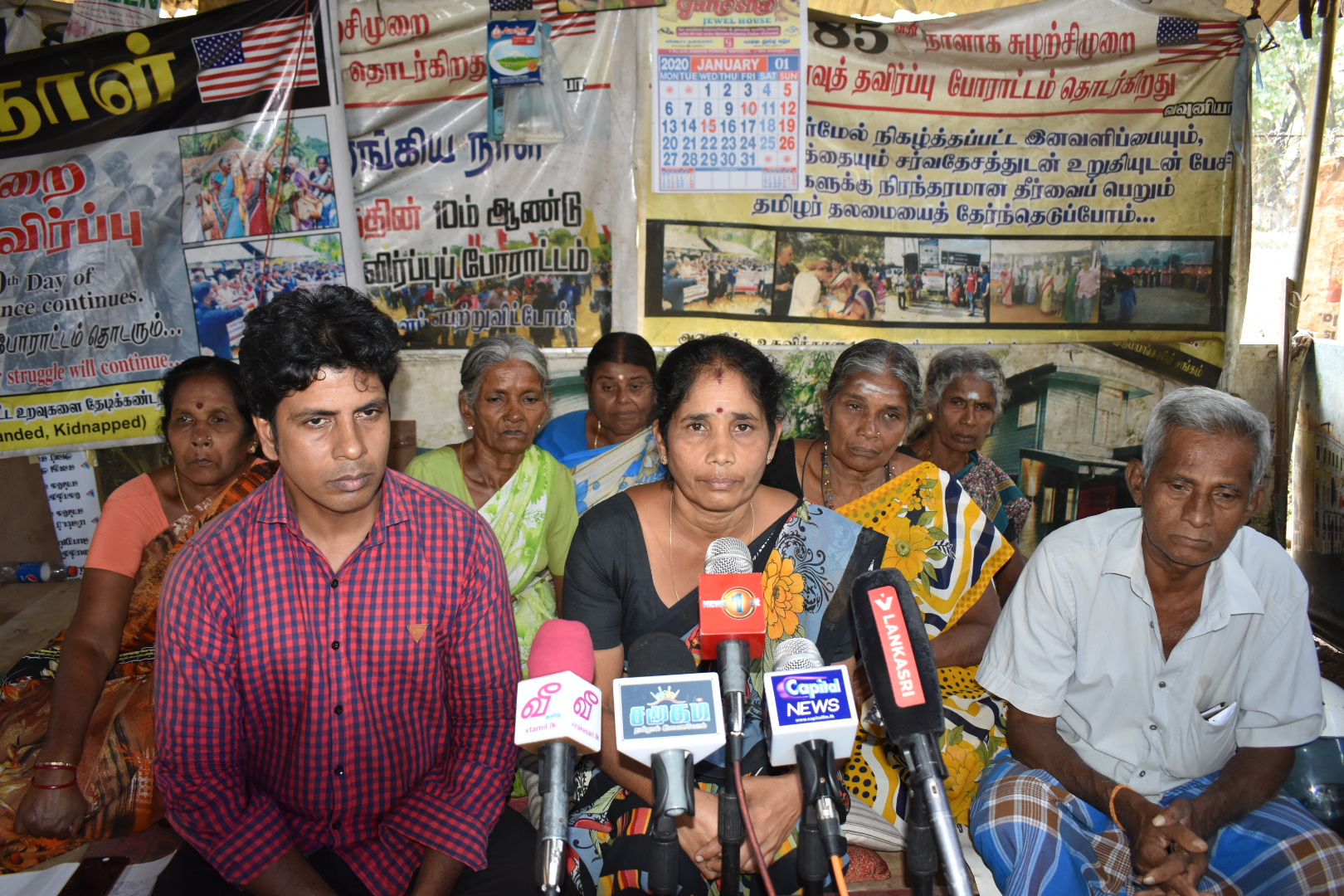Sri Lanka’s Terrorism Investigation Division (TID) attempted to pressure the families of the disappeared to end their campaign for accountability, as they interrogated a protest leader in Colombo last week.
Leader of the Vavuniya protest Jeyavanitha Kaasipillai and her husband were summoned to Colombo by Sri Lanka’s counter terror police, where they were questioned about the protests that Tamil families of the disappeared had undertaken for over 1,000 days across the North-East.
Her daughter Jeromy, was abducted by Sri Lankan soldiers in 2009, when she was just 17-years-old.

File photograph: Kaasipillai at a protest with photographs of her daughter
In 2018, British-based ITV News also interviewed Kaasipillai, after she spotted a photograph with then-president Maithripala Sirisena and a young girl who looked like her disappeared daughter;
“The mother, Jeyavanitha, says she first saw the photo when it was used in a pamphlet during the 2015 presidential election campaign.
She said when she recognized Jeromy she was so overcome by emotion she burst into tears.
When he was on the campaign trail in 2015, Mrs Kasipillai got to meet President Sirisena in person.
She said that when she produced the photo and pointed out her daughter he broke into a cold sweat.”
During the interrogation, she reported that the TID produced a young woman who they said was the girl in the photograph, but Kaasipillai firmly rejected the claim, saying that the girl in the photograph is her daughter and not the young woman they produced.
Speaking to reporters last week, she recounted her interrogation and surprise when officers brought out the young woman during questioning.
“This is not my child,” she recalled telling officers. “The one in the photo is my child, the girl you brought is a different girl. I refused this conclusively.”
US News interviewed Kaasipillai in 2017, as she recalled the final moments in which her daughter was forcibly taken;
“Kasipillai and her 17-year-old daughter, Jeromy, were running toward safety during a shelling attack when a pickup truck approached. Several men wearing military uniforms jumped out of the truck and, without a word, threw both women in the back, where a group of frightened families huddled together.”
“"Let us jump now, I'd rather die on the road," Kasipillai recalls Jeromy saying. Kasipillai told her not to worry, that nothing would happen in her presence. Minutes later, the men shoved Kasipillai and another mother from the truck. The last she saw of her daughter was her blurring face as the vehicle sped off in the sand.”
Kaasipillai went on to state that other protestors had also faced similar tactics by the Sri Lankan security forces during questioning.
“The problem right now is that their intention is to tarnish our protest,” she said and called for international involvement in helping to locate their disappeared children, fearing that without foreign oversight, the Sri Lankan security forces would soon be interrogating every family of the disappeared.
“International countries must come for us to receive a resolution and justice for our children… Mothers in alliance with us should all voice in unity, and state that we need the international countries to be involved. If we all ask for international intervention, I believe that within 2-3 months the international community will come and grant us the justice we’re seeking.”
“However, if we all remain separated, [the TID] will call everyone individually for interrogations in an attempt to close off our protest.”
She told reporters that she was firm in telling the TID officers that she was not only seeking justice for herself but also for all the mothers waiting for their children's return.
“I have not just asked for my child," she said. "I have asked for every child that has gone missing, for the children of all the mothers."
Her remarks come just days after Sri Lankan president Gotabaya Rajapaksa told the United Nations’ resident co-ordinator on the island that the thousands of forcibly disappeared and missing Tamils “are actually dead”, in a widely condemned declaration on Friday.
We need your support
Sri Lanka is one of the most dangerous places in the world to be a journalist. Tamil journalists are particularly at threat, with at least 41 media workers known to have been killed by the Sri Lankan state or its paramilitaries during and after the armed conflict.
Despite the risks, our team on the ground remain committed to providing detailed and accurate reporting of developments in the Tamil homeland, across the island and around the world, as well as providing expert analysis and insight from the Tamil point of view
We need your support in keeping our journalism going. Support our work today.
For more ways to donate visit https://donate.tamilguardian.com.


